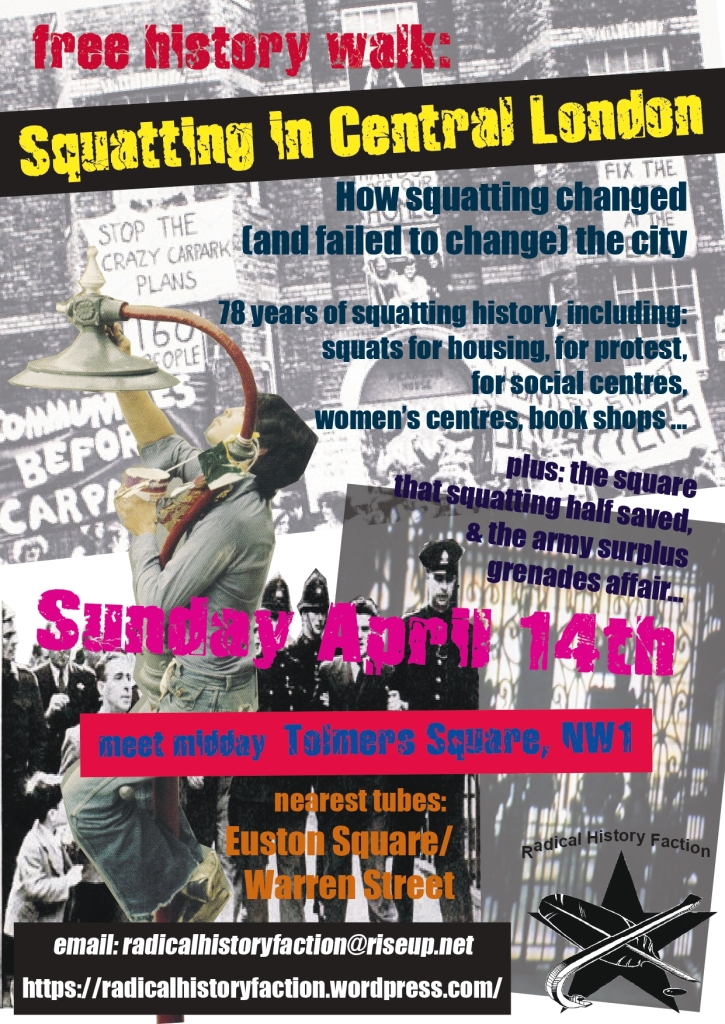
Radical History Faction stretches its wings this year and flies beyond Hackney and Islington.
Several walks are planned* – the first is Sunday April 14th, 2pm Tolmers Square NW1.
*Including a Hackney one, don’t worry!


Radical History Faction stretches its wings this year and flies beyond Hackney and Islington.
Several walks are planned* – the first is Sunday April 14th, 2pm Tolmers Square NW1.
*Including a Hackney one, don’t worry!
The 2024 Radical History Faction programme will be unleashed in the near future. Until then, here are some other Hackney happenings you may be interested in:
Hackney Art Activism Festival 27 April – 6 May
“A 10 day sound + visual art festival exploring community resistance to policing in Hackney from 1980s to today.
Venues + Locations: Gillett Square, The Vortex, C.L.R. James Library, Hackney Archives, The RIO + Online.”

https://reelrebelsradio.com/if-mi-nuh-laugh-mi-cry-hackney-art-activism-festival
One of the reasons this site started was the lack of information available about community responses to corrupt, racist and violent policing in Hackney in the eighties and nineties, specifically the amazing work done by Hackney Community Defence Association.
It looks like a number of people who were active in HCDA are involved with this event. There are lots of great things in the programme, but everyone should go to the free exhibitions at Hackney Archives and Gillett Square.
Some good times to visit might be the We Remember HCDA celebration and vigil at 2pm-8pm on Saturday 27th April and the Archiving and Legacy event with speakers from HCDA at 1pm to 4pm on Sunday 28th April.
Gillett Square has specifically been chosen because of its proximity to Bradbury Street, which was home to the HCDA HQ, the Colin Roach Centre – as well as number of other co-operatives. The square is not immune to local pressures and struggles and an anti-gentrification protest was held there in 2006. Since then it has been a contested space, being a cornerstone of “radical black history” and also, more ominously, the focus of an award winning redevelopment by architects. Clearly the festival is squarely in the tradition of the former…
Hackney History Festival 10th-12th May

Including: Susan Doe on Hackney’s Suffragettes, Breda Corish on how the campaign for Home Rule in Ireland played out in Hackney, Stephen May on the weeks Stalin, Lenin, Trotsky, Rosa Luxemburg spent in Hackney in 1907 and a Black History Walks tour of Dalston.
Talks are mainly £3 or free.
The venues also have their own radical histories:
Hackney Museum
Finally, I should really get along to the museum and check these exhibitions out:
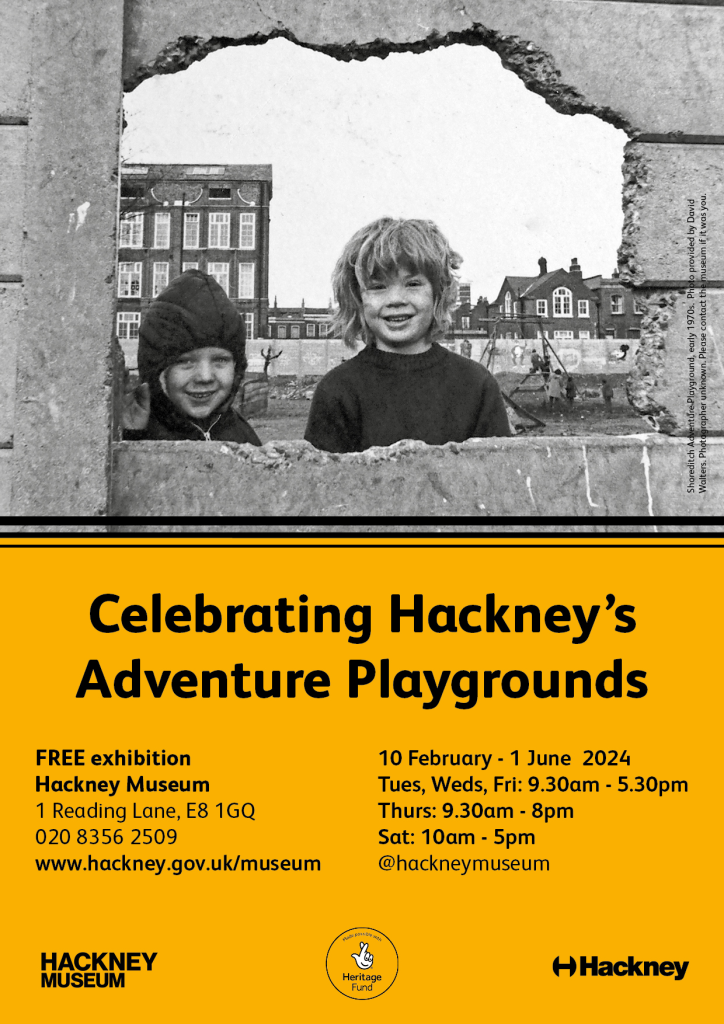


PEER is an small gallery halfway along Hoxton Street. Their current exhibiton “traces artistic, cultural and social collective work that took place in Hackney between 1971 and 1986.”:
“Bringing together new commissions, existing artwork, literature, film and archival material, the exhibition and accompanying events programme explores the radical, influential and often entwined histories of cooperative and collective work in the borough. Examining how social and political commitments were supported by an engagement with art, literature and culture, the exhibition focuses on the complexities of collective work, and questions how we might learn from the past in order to reimagine our futures.”
The title “we are a group of people…” originates in the founding document of communithy cafe, publisher and resource Centerprise from 1971. The endpoint of 1986 is when the Greater London Council closed.

It was exciting to see the two original murals by Jacob V Joyce that had been commissioned for the event, covering as they do a lot of the projects featured on this site over the years.
The bulk of the exhibtion is archival material under glass. It’s a bit of a hodge podge, which is a fair representation of the diversity of community projects and local politics in the time covered. I was glad to see a strong focus on feminist and childcare issues along with CND, anti-racism etc.

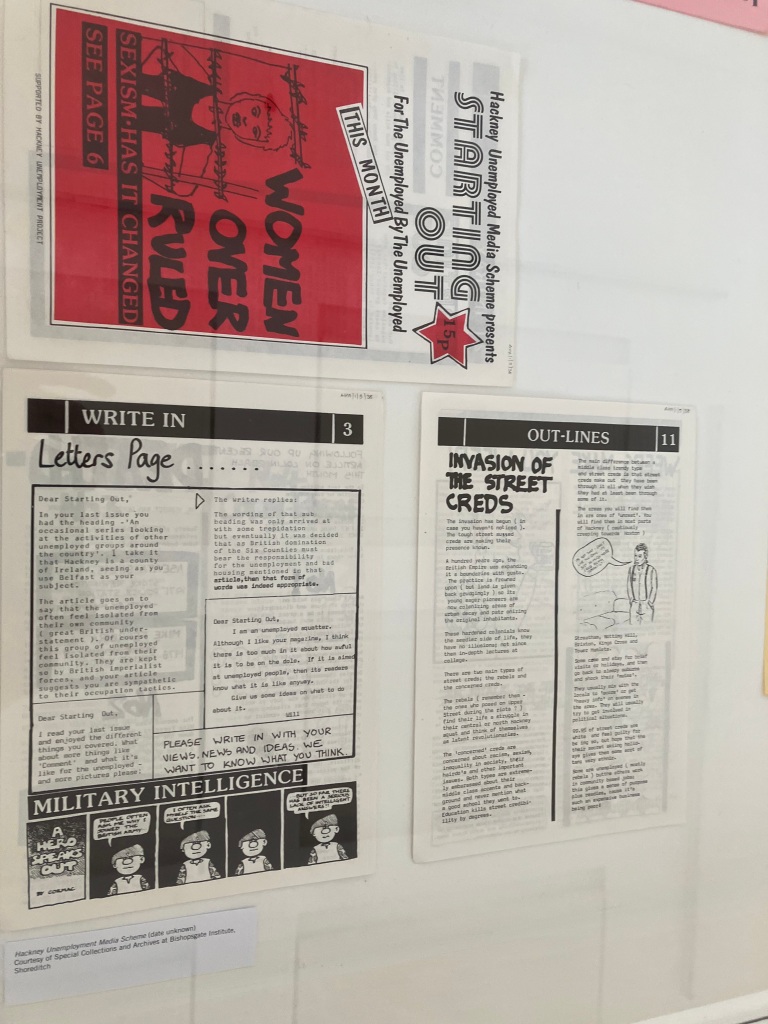
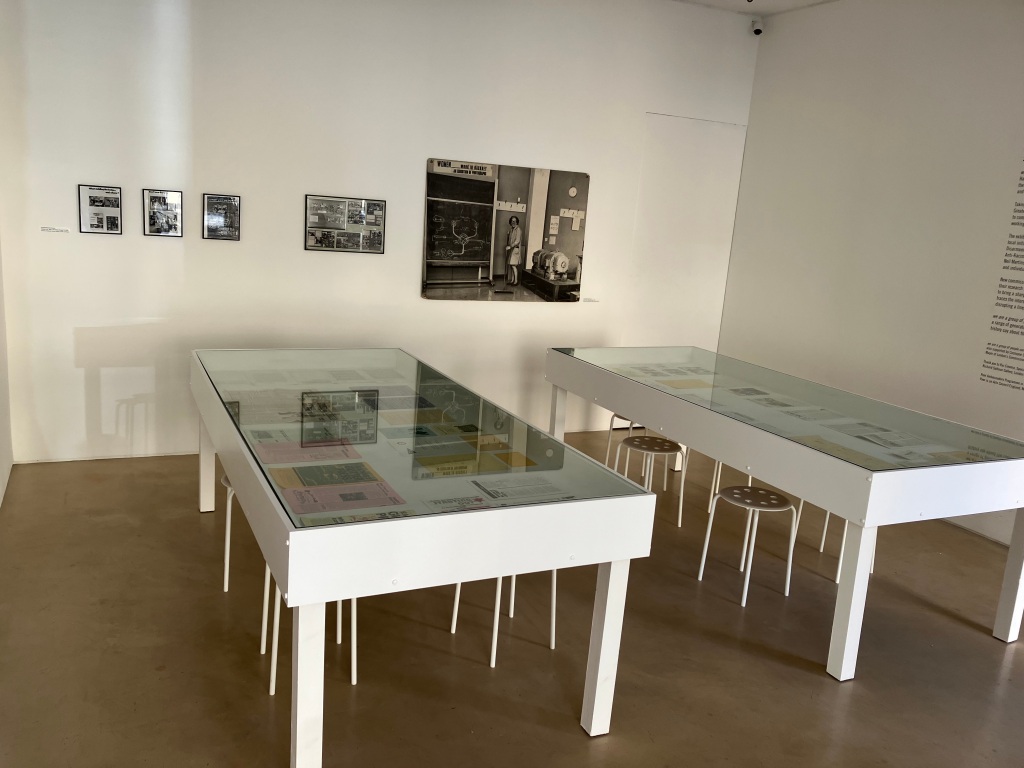
It’s always great to see this stuff out and about, but my usual criticism applies – if people are interested in the material being presented they might want to read it cover to cover. And they can, because I’ve whacked a load of it online. (See below for links).
The archival publications are supplemented by some excellent photographic artwork by people including Jo Spence (Hackney Flashers) and Neil Martinson (who I believe learned photography at a Centerprise youth workshop). Also a couple of paintings, but these seemed to relate to material slightly to the east of Hackney.
There are also two films playing on a loop – One Day (off) in Hackney (1980), which relates to the Rio Tape-Slide project, plus the umissable Somewhere in Hackney (1980), which is a longer film covering community groups active in Hackney including Centerprise, Lenthal Road Print Workshop and Caribbean House. My visit unfortunately was too late in the day to see “One Day (off)” so I will need to go back to check that out.
There are also a bunch of interesting events tied to the exhibition, and I was a bit irritated with myself for not finding out about it sooner as I’ve missed some that looked interesting. Anyway, stil to come is:
Thursday 3 August, 6.30pm Writer and academic, Adam Elliott-Cooper responds to the exhibition focusing on the history of Black resistance to state racism and racial violence in London. Adam’s first monograph, Black Resistance to British Policing, was published by Manchester University Press in May 2021 and he is co-author of Empire’s Endgame: Racism and the British State (Pluto Press, 2021).
Saturday 12 August, 1pm – 4pm As part of Hoxton Street Summer Fair join On the Record as part of the Grow Your Own oral history project for an interactive, zine making workshop exploring the history of community action for childcare in Hackney. In the 1970s campaigners demanded better childcare and created nurseries and children’s centres for everyone to use. Discover what we can learn from this history to help us tackle the childcare crisis we face today. The workshop is suitable for ages 6+ with drop-in sessions running between 1pm – 4pm.
Thursday 31 August, 10.30am – 12.30pm Hackney based artist Aya Haidar leads a workshop for Hackney Circle members that responds to Peer’s exhibition programme. Hackney Circle is a membership community for older residents of Hackney interested in creative and cultural events and activities. If you want to find out more please ask a member of staff for more information.
There is also a related showing of the film Breaking Ground (2013) about Stoke Newington Irish Womens Centre at the Rio Cinema on 6 September.
Which leads me to another mild criticism of the exhibition and its framing around GLC funding. There is no doubt that the GLC supported a lively culture of resistance in London and many groups struggled to survive after Thatcher abolished it. This is covered really well in the Breaking Ground film which shows how Stoke Newington Irish Women’s Centre had to allocate much of its time and resources to funding bids and the respectabilithy that entailed. But the Centre did manage to continue until 2012, some 26 years after the GLC was abolished. This is a testament to the immense work put in by the Irish women of the Centre and their tenacity. At the other end of the spectrum, I’d be very surprised if the radicals at Hackney Gutter Press were ever funded by the GLC.
Of course, there needs to be a cut-off point with any physical exhibition and the curators have done an excellent job. I’d strongly recommend a visit to PEER to see all this, but bear in mind that Hackney’s “artistic, cultural and social collective work” extends far beyond 1986 and has never been solely reliant on state funding.
“we are a group of people composed of who we are” runs until 9 September 2023.
Wednesday to Saturday, 12 – 6pm
Free Admission
PEER is at 97-99 Hoxton Street, London, N1 6QL.
https://www.peeruk.org/we-are-a-group-of-people
Some things in the exhibition you can read in full here:
And a wealth of other related Hackney radical publications on our archive.org site.
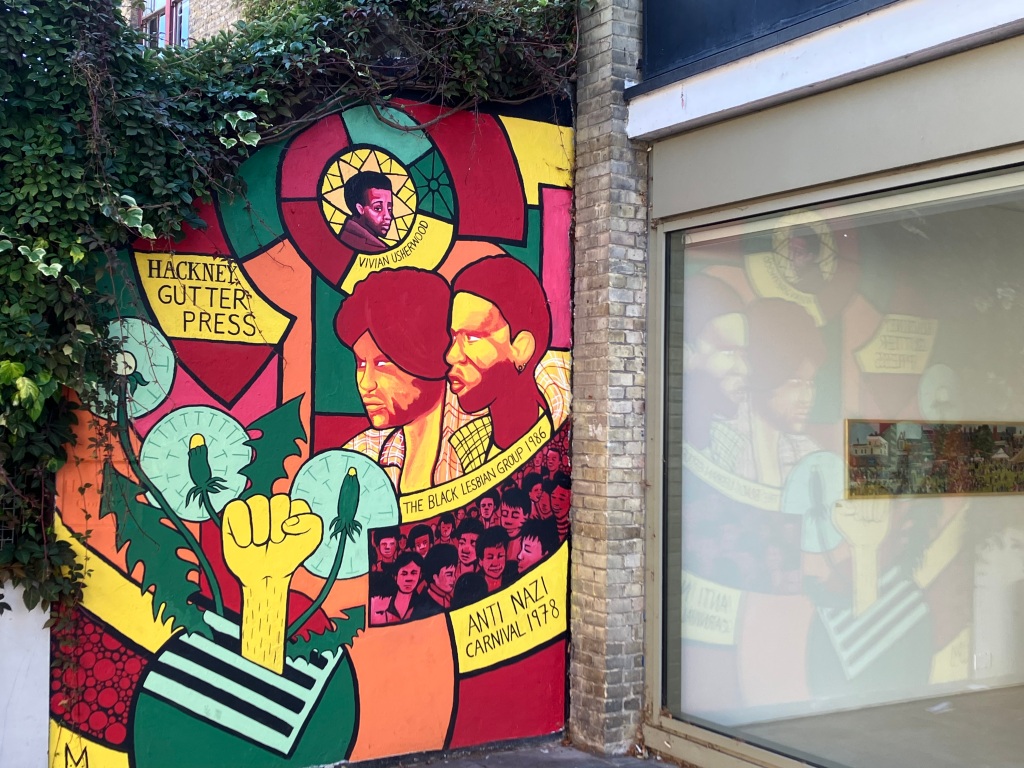

Contributors to this site and other comrades did a series of walks last year. They went really well and we had a great bunch of interesting people come along and contribute. So we are at it again!
It’s a great opportunity to take radical historty of the screen and back onto the streets. And maybe have a pint afterwards.
Put these dates in your diaries and tell friends…
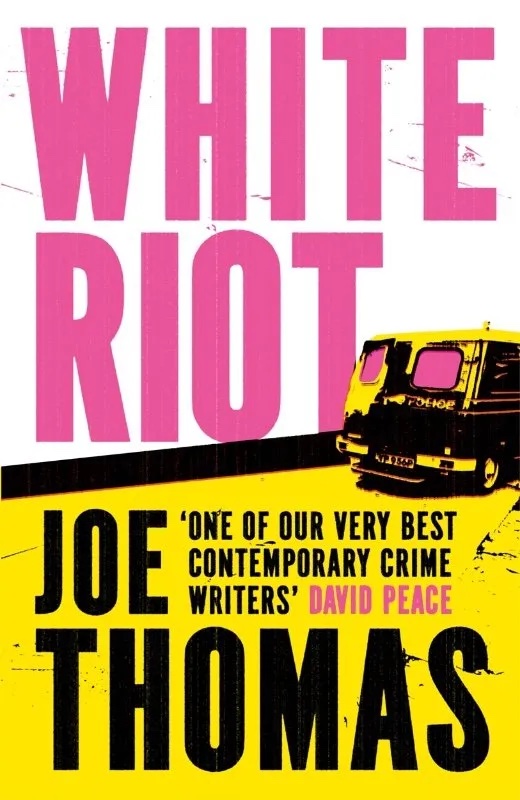
Back in January I wrote a brief review of Joe Thomas’ excellent novel White Riot, which uses material from this site to paint a vivid picture of Hackney residents and police in the 1970s and 80s.
The author will be discussing his book at Stoke Newington Literary Festival this Sunday 6pm at the radical venue of Newington Green Meeting House.
Tickets are £5 and some are still available.
Other events this weekend include HIstory of Stokey and a session on working men’s clubs vs private members clubs. Full programme and other information can be found at:
There is an entertaining interview with Class War founder Ian Bone about his time in Hackney in the 1980s over at anarchist newspaper Freedom:
Ian’s autobiography Bash The Rich: True-Life Confessions of an Anarchist in the UK is a rip roaring read.

I use and endorse the 2023 London Rebel History Calendar by comrades Past Tense. This is now available at their etsy store for half price! Also still available from good independent London bookshops.

The long running and excellent Working Class History podcast has now launched a global map of struggles and radical events. This is an amazing resource which is well worth a play with. There is an accompanying stories app for people wanting more informartion and also an episode of the podcast that explains the background and how it all works.
For nerds like me there are a bunch of things that could be added – and it will be fascinating to see how the project develops now its been launched.
Events
Tue 28 Feb, 18.30-19.30: Hackney History have a talk at Hackney Archives on “Serious Money and Hackney: Urban explorer Caroline Knowles explores how finance has taken up residence in Hackney & Shoreditch. What does this mean for those who live there?” (Free)
March 20th: Pages of Hackney have organised an event “On Prisons, Borders, and Abolition” in support of Hackney Migrant Centre at BSix College (£6-£8):

Slighty short notice but there is an online book launch of “Write Women Into History: Recollections from older Hackney feminists” this Thursday.
My review of the book is here: https://hackneyhistory.wordpress.com/2022/02/05/hackney-howlers-write-women-into-history/
A few upcoming events of interest I’ve happened across – feel free to get in touch with anything I’ve missed…
Wednesday 23rd February 7pm:
Their Story in Hackney: Progressive Activism and Queerness
with Richard & Kieran Kirkwood
£5/£3 concessions – book here
VFD 66 Stoke Newington Road, London N16 7XB
Join us at VFD for an insightful talk on the activism and human rights movements that have taken place in Hackney from the 60s onwards. We’ll hear from Richard Kirkwood who participated in many of these movements and from Kieran Kirkwood who builds upon their father’s work as an organiser for London’s Renters Union, climate activists Wretched of the Earth and saving culture movement Save Ridley Road.
We’ll talk about the link between the radical history and politics of Hackney, how that attracts queer arts communities which in turn attracts investment and gentrification which then means they are no longer welcome or can afford to live in the area.
Richard and Kieran Kirkwood
Richard is a former senior lecturer of social science at London Met University is Hackney born and bred and was involved as a young man in the politics of the area and was a regular ‘space keeper ‘at Speakers Corner on Ridley Road Market in efforts to keep Nazi’s off the Corner. He was involved with many unions from the 70’s onwards as well as organising movements, groups and individuals. He is still an activist and has incredible knowledge and insights of Hackney’s history and can relate them to movements happening nationally and internationally.
Saturday 26th February 12pm/2pm:
Guided Walking Tour with Queer Hackney Resident Lavinia Co-op
£10 book here.
Start at: VFD 66 Stoke Newington Road, London N16 7XB
Discover Hackney’s history, guided by performance artist Lavinia Co-op, sharing stories of life in Hackney.
Lavinia has lived most of his life in Hackney and was a member of the radical queer theatre group The Bloolips from the 1970’s to 1990’s.
Thursday 10th March 7pm:
Misbehaviour: Learning From the Women of the Grosvenor Avenue Commune
Donation book here.
Newington Green Meeting House

Come along to meet and hear from some of the women who used to live in a commune in Grosvenor Avenue, Stoke Newington.
This group famously demonstrated against the Miss World Contest in 1970 (which was watched by 100 million people worldwide).Their book, “Misbehaving”, told the fascinating true story behind the 2020 film about the protest, which starred Keira Knightley – and which was a hit with fans.
Saturday 12th March 7:30pm:
Hackney Downs: The School that Dared to Fight and Didn’t Deserve to Die
Betty Hales and Jeff Davies, the last Head & Deputy Head of Hackney Downs School
Free/donation
St John’s Church Hall, next to the church opposite Matalan, High Road, Leytonstone, London E11 1HH
News From Nowhere Club was founded in 1996: “the club challenges the commercialisation and isolation of modern life and meets monthly on Saturdays.”
There is much of interest in its 2022 programme, but this forthcoming event is particularly of relevance to Hackney:
In July 1995, Hackney Downs School won a prolonged battle to stay open, against a corrupt, incompetent Local Education Authority, convincing the full council to vote against the recommendation of its own Chief Education Officer: an amazingvictory, yet just ten days laterit was taken over by the East London Education Association, a quango set up by the then failing Tory government, desperate to put the blame for all social ills on anyone but itself.
The school was closed with unseemly haste & callous cruelty to pupils, parents & staff. This is a story of loyalty and passion against injustice which set the scene for the negative blame culture of bureaucracy, target setting & over-testing that has plagued education for the past 25 years.
Free entry. Donations/Raffle/Voluntary Membership £5pa
7.30pm Buffet (please bring an item if you can:vegetarian or vegan only.)
No entry before 7.30pm please.
8.00pm Talk and discussion till about 10pm
Leytonstone tube, exit left, two minute walk / Overground: Leytonstone High Road, turn left, ten minute walk / Buses 66, 145, 257, W13, W14, W15, W19 / Disabled access / car park in front of church / bikes can be brought in / Quiet children welcome / You can phone to confirm the talk will be as shown / Open to all; no booking, just turn up
We are on Facebook Twitter @Nowhere_Club / Enquiries 0208 555 5248 / Email: williammorrisnews@outlook.com / Web:newsfromnowhereweb.wordpress.com / Talks are recorded and put on our website


Ridley Road
The response to the BBC TV series has generally been favourable, which is interesting as militant physical force anti-fascism is not especially en vogue in 2021.
Our friends History is Made at Night and Past Tense have both written some great pieces on the events that inspired the TV series. The Radical History of Hackney piece is here.
There have naturally been some terrible takes from the usual right wing pundits about how the influence of Colin Jordan’s band of Nazis was overstated in the show and that they would never have seized power. This misses the point that neo-Nazi groups can make life miserable for ordinary people on a day to day basis – and they can shift the “overton window” of political discourse to the far right and influence mainstream parties that way.
History Workshop have produced an absolutely cracking podcast about the history and struggles of Ridley Road market:
It includes some great oral history about the fight against Oswald Mosley’s fascists, but the accounts from market traders about recent battles against regeneration are even more interesting. Interviewees include local resident Tamara Stoll, who has published a photo book on the social history of the market and was one of several people to work on the essential Rio Tape Slide Reel book.
December Events
Newington Green Meeting House has a couple of interesting things happening at the moment:

An exhibition on the history of the Gay Liberation Front that runs until December 16th. (Free)
A night of music celebrating working class composers on December 3rd. (Donation)

And finally a film night on December 9th with two documentaries about tenant and community struggles in Islington in the 1970s. (£5)
The Hackney Society are running a talk there entitled “Who Wants To Go To Hackney?” on December 15th:
When proposals for Crossrail 2 (originally called the Chelsea to Hackney line) were first considered by Government Mrs Thatcher was Prime Minister and the plans were passed in front of her for approval. Her memorable (and deadly) response was reported to be: “Hackney! Hackney! – who wants to go to Hackney?”
Christian Wolmar, the celebrated railway historian and journalist, will talk about the long and tortuous battles for London’s railways.
(Online and also in person at Newington Green Meeting House – £11.25 or cheaper for Hackney Society members)
Good things to read
Undercover Met officers may have infiltrated Hackney CND: Hackney Gazette – more wrongness revealed during the Undercover Policing Inquiry.
Ken Williams, 1953-2020: Anarcho-syndicalist and militant anti-fascist – this obituary published by Kate Sharpley Library includes some great memories of Ken’s time in Hackney in the 1980s.
Crass Go Disco by Expletive Undeleted sheds light on the under-explored overlap between the anarchopunk movement on the 1980s and the rave movement of the 1990s. It is extraordinarily comprehensive and there are a few references to gigs, squats raves etc in Hackney.
Hackney Reggae
The new space outside the revamped Britannia Leisure Centre was named BRAFA square following extensive engagement with the local community. BRAFA was the British Reggae Artists Famine Appeal – a benefit single and live event inspired by Live Aid – or rather, the lack of black artists involved with Live Aid.
Hackney Museum have produced a useful film about the story of BRAFA and launch of the square:
In other Hackney reggae news, I thoroughly enjoyed the memorial event for veteran dancehall soundsystem operator Ruddy Ranks that Hackney Archives organised in October:

The evening at BSix College included the unveiling of a plaque for Ruddy, who attended school there when it was called Brooke House – as well as many memories of someone who was by all accounts a proper Hackney character. The Archives have some film of the event which I am sure they were upload in due course for people who couldn’t attend.
Hackney Slave Traders


The Museum of the Home has issued another statement about its statue honouring slave trader Robert Geffrye. Whilst this statement is an improvement on previous ones, it basically just says that the museum feels bad about the statue being there. It has been surprising to see how much praise this has generated.
I am firmly in camp Vernon on this one and would encourage people not to visit the museum until the statue is removed:
Meanwhile the Council has been quietly getting on with asking local people what they want to be done with the remnants of slave-trading – and then doing something about it. (Like most people I am hardly a fan of the council, but credit where credit is due!)

In July, Cassland Road Gardens in Homerton (named after slavetrader John Cass) was rebadged as Kit Crowley Gardens in honour of a local community stalwart.
I was also pleased to see Tyssen Community School near Clapton Common (named after the slave-trading Tyssen family) was putting up some new signs to mark its renaming as Oldhill School:

Just nice things
It’s been a tough couple of years. I think we all need to be reminded that good people in the community have been doing their best to crack on and make things better with very little resources. These two films about grass roots sports in Hackney both cheered me up immensely.